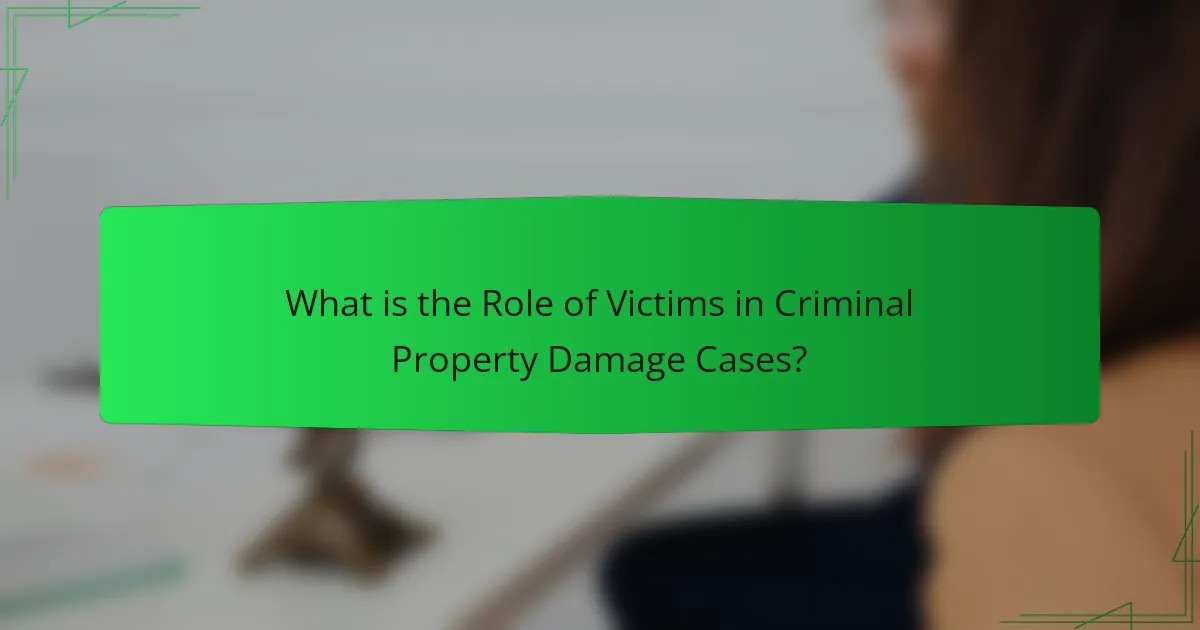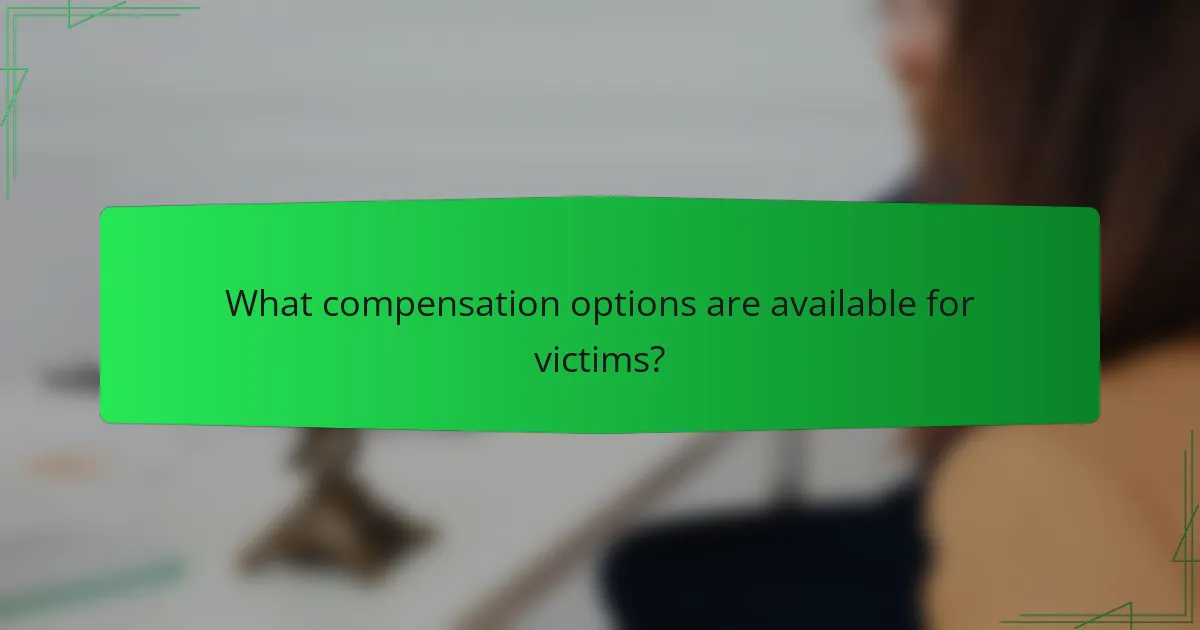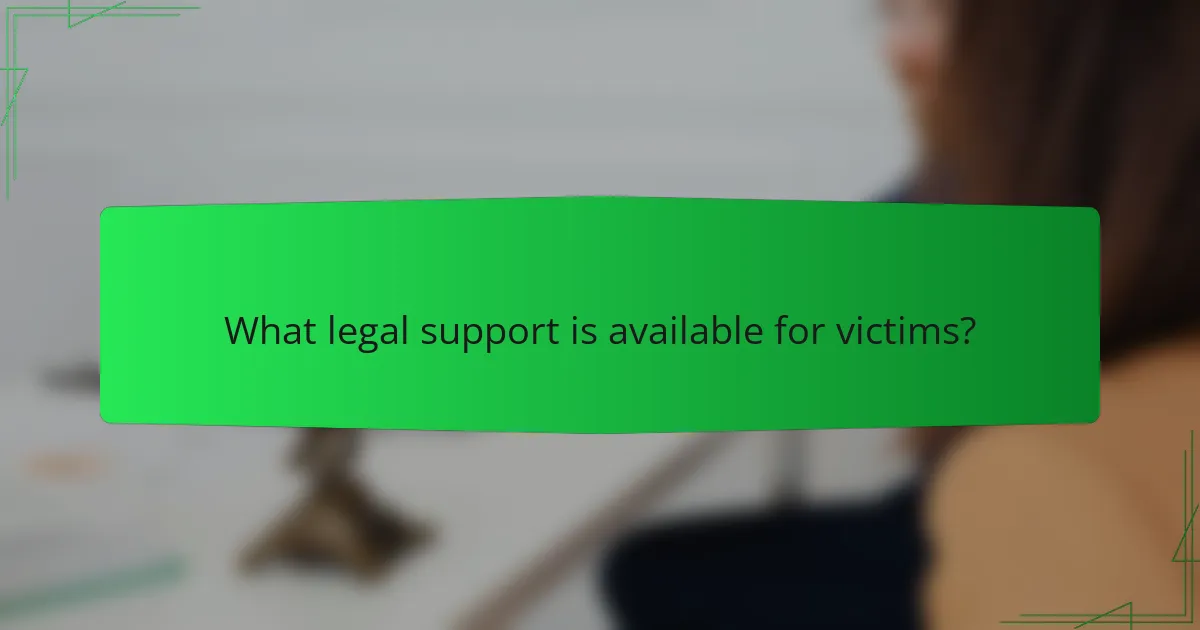Victims in criminal property damage cases are essential participants in the legal process, providing critical evidence such as photographs, witness statements, and repair estimates. They have the right to report crimes and their testimonies are often vital for investigations and court proceedings. Victims can pursue compensation through various avenues, including restitution, insurance claims, and civil lawsuits, each with specific eligibility criteria. Legal support is available to assist victims, encompassing legal representation, victim advocacy services, and counseling to help them cope with emotional trauma. Additionally, compensation programs in many jurisdictions aim to cover medical expenses, lost wages, and property damage, empowering victims throughout their recovery journey.

What is the Role of Victims in Criminal Property Damage Cases?
Victims in criminal property damage cases play a crucial role in the legal process. They provide essential evidence regarding the damage incurred. This evidence can include photographs, witness statements, and repair estimates. Victims also have the right to report the crime to law enforcement. Their testimony may be vital during investigations and court proceedings. Furthermore, victims can seek compensation for damages through legal channels. This compensation often covers repair costs, lost property value, and emotional distress. In many jurisdictions, victims have specific rights outlined in victim rights laws. These laws aim to ensure that victims are informed and supported throughout the legal process.
How do victims influence the outcomes of criminal property damage cases?
Victims influence the outcomes of criminal property damage cases primarily through their testimonies and impact statements. Their accounts provide crucial evidence for the prosecution. Victims can help establish the severity of the damage and the emotional toll it has taken. This information can sway a jury’s perception and decision. Additionally, victims may participate in plea negotiations, potentially affecting sentencing outcomes. Their willingness to cooperate with law enforcement can also lead to more robust investigations. Victim advocacy groups often assist in amplifying their voices and ensuring their rights are considered. Studies show that victim involvement can lead to higher conviction rates in property damage cases.
What legal definitions apply to victims in these cases?
Victims in criminal property damage cases are defined as individuals who have suffered harm or loss due to the actions of another. This definition encompasses both physical and emotional harm resulting from criminal acts. Legal frameworks often classify victims based on the severity and nature of the crime. For instance, statutes may recognize victims as those directly impacted by property damage. Legal definitions also extend to include victims’ rights to seek restitution and compensation. In many jurisdictions, victims have the right to participate in legal proceedings. They may also be entitled to support services, including counseling and legal assistance. These definitions and rights are established to ensure victims receive justice and support.
How are victims’ perspectives considered in court?
Victims’ perspectives are considered in court through victim impact statements. These statements allow victims to express how the crime affected their lives. Courts often use these statements to inform sentencing decisions. Victim impact statements can influence the judge’s perception of the crime’s severity. Additionally, some jurisdictions allow victims to testify during the trial. This testimony can provide emotional and contextual evidence. Research shows that victim perspectives can lead to more informed judicial outcomes. For instance, studies indicate that judges often consider the emotional impact on victims when determining sentences.
What rights do victims have in criminal property damage cases?
Victims in criminal property damage cases have the right to seek restitution. Restitution allows victims to recover the costs associated with the damage to their property. This can include repair costs, replacement costs, and any related expenses. Victims also have the right to participate in the legal process. This includes being informed about court proceedings and having the opportunity to make statements. Additionally, victims may have the right to file a civil lawsuit for damages. This can provide further financial recovery beyond restitution. Laws vary by jurisdiction, but these rights are generally recognized. For example, many states have victim compensation programs to assist with expenses.
What specific legal protections are available to victims?
Victims have specific legal protections that vary by jurisdiction. These protections often include the right to file a police report and access victim advocacy services. Additionally, victims may be entitled to restitution from offenders for damages incurred. Many jurisdictions provide protective orders to prevent further harm or harassment. Victims also have the right to be informed about court proceedings and to participate in them. Laws such as the Victims of Crime Act in the United States establish funding for victim services. These protections aim to ensure victims receive support and justice during legal processes.
How can victims assert their rights effectively?
Victims can assert their rights effectively by understanding their legal entitlements and taking proactive steps. They should document all incidents related to the crime, including photographs and witness statements. This evidence can support their claims for compensation or legal action. Victims should also seek legal advice to navigate the complexities of the legal system. Engaging with victim support services can provide essential resources and guidance. Additionally, victims should be aware of their rights under relevant laws, such as the right to restitution. By being informed and organized, victims can enhance their ability to assert their rights successfully.

What compensation options are available for victims?
Victims of criminal property damage have several compensation options available. These options include restitution, insurance claims, and civil lawsuits. Restitution is a court-ordered payment made by the offender to the victim. Insurance claims can provide financial recovery for property loss or damage. Civil lawsuits allow victims to seek damages from the responsible party. According to the Bureau of Justice Statistics, restitution is often mandated in criminal cases involving property damage. Each option has specific eligibility criteria and processes that victims must follow to obtain compensation.
How is compensation determined in criminal property damage cases?
Compensation in criminal property damage cases is determined based on the value of the damaged property. This value is typically assessed through appraisals or estimates provided by professionals. Courts may consider repair costs or replacement costs as part of the assessment. The compensation amount can also include any additional losses incurred due to the damage, such as loss of use. In some jurisdictions, punitive damages may be awarded if the offender acted with malicious intent. Documentation of the damage and expenses is crucial for victims to substantiate their claims. Victims often need to provide receipts, photographs, and expert evaluations to support their compensation requests. The final compensation amount is ultimately decided by the court during the legal proceedings.
What factors influence the amount of compensation awarded?
The amount of compensation awarded in criminal property damage cases is influenced by several key factors. These factors include the extent of the damage incurred, which determines the financial loss suffered by the victim. The cost of repairs or replacement is a critical element in calculating compensation. The value of the damaged property also plays a significant role in the compensation amount. Additionally, the emotional distress experienced by the victim can be considered, affecting the overall award. Legal precedents and jurisdictional guidelines may further influence compensation amounts. Insurance coverage available to the victim can also impact the final compensation awarded. Lastly, the actions of the perpetrator, such as intent or negligence, may be assessed to determine compensation levels.
What types of damages can victims claim?
Victims can claim several types of damages in criminal property damage cases. These include compensatory damages, which cover actual losses incurred. Victims may also claim punitive damages, intended to punish the offender. Emotional distress damages can be pursued for psychological impact. Additionally, victims may seek reimbursement for legal fees and costs associated with recovery. Loss of use damages account for the inability to use property during repairs. Each type of damage aims to restore the victim’s situation as closely as possible to its pre-damage state.
What are the processes for victims to seek compensation?
Victims can seek compensation through several processes. First, they should report the crime to law enforcement. This establishes an official record of the incident. Next, victims can file a claim with their insurance company if applicable. This may cover property damage or personal losses. Additionally, victims may pursue restitution through the criminal court system. This allows them to request compensation from the offender during sentencing. Some jurisdictions also have victim compensation programs funded by the state. These programs provide financial assistance for certain expenses related to the crime. Victims must typically apply for these funds and meet specific eligibility criteria. Each process may vary based on local laws and regulations.
How can victims file for restitution in court?
Victims can file for restitution in court by submitting a formal request during the criminal proceedings. This request typically occurs at the sentencing phase of the case. Victims must provide documentation of their losses, such as receipts or estimates for damages. They should attend the court hearing to present their case. The judge will evaluate the evidence and determine the restitution amount. If granted, the defendant is ordered to pay the specified amount to the victim. This process is supported by laws in many jurisdictions that allow victims to seek compensation for their losses.
What documentation is required to support compensation claims?
Documentation required to support compensation claims includes police reports, medical records, and receipts for damages. Police reports provide official documentation of the incident. Medical records validate injuries sustained during the incident. Receipts for damages demonstrate the financial impact of the crime. Additionally, photographs of the damage can serve as visual evidence. Witness statements may also support claims by corroborating the victim’s account. These documents collectively establish the basis for compensation claims.

What legal support is available for victims?
Victims have access to various forms of legal support. This support includes legal representation, victim advocacy services, and counseling. Legal representation can help victims navigate the judicial process. Victim advocacy services provide information about rights and available resources. Counseling services can assist victims in coping with emotional trauma. Additionally, many jurisdictions offer compensation programs for victims of crime. These programs may cover medical expenses, lost wages, and property damage. Legal aid organizations often provide free or low-cost services to those in need. Overall, these resources aim to empower victims and facilitate their recovery.
How can victims access legal representation?
Victims can access legal representation through various means. They can seek assistance from legal aid organizations that provide free or low-cost services. Many bar associations also offer referral services to connect victims with attorneys specializing in their case type. Additionally, victims may consult with local law schools, where students provide legal assistance under faculty supervision. Some private attorneys offer free consultations to evaluate cases. Furthermore, victims can utilize online resources to find attorneys with experience in criminal property damage cases. These methods ensure victims receive the legal support they need to navigate their situation effectively.
What resources are available for finding legal aid?
Legal aid resources include government-funded programs, nonprofit organizations, and legal clinics. Many states have legal aid offices that provide assistance based on income eligibility. Websites like Legal Services Corporation offer directories to find local legal aid providers. Additionally, bar associations often have referral services for low-cost or pro bono legal help. Community organizations may also connect individuals with legal resources. Online platforms can provide information on specific legal issues and available aid. These resources aim to ensure access to legal support for those in need.
What role do victim advocacy groups play in legal support?
Victim advocacy groups provide essential support in legal contexts for victims of crime. They assist victims in understanding their rights and the legal process. These groups offer emotional support and guidance throughout court proceedings. They often help victims prepare for testimonies and navigate complex legal systems. Advocacy groups may also connect victims with legal resources and representation. They work to ensure that victims’ voices are heard in legal settings. Statistics show that victims who engage with advocacy groups experience better legal outcomes. This support is crucial for empowering victims and facilitating their recovery.
What are the benefits of legal support for victims?
Legal support for victims provides essential guidance and advocacy throughout the legal process. It helps victims understand their rights and options. Legal support can also facilitate access to compensation for damages incurred. Victims with legal representation often experience better outcomes in court. Studies show that represented victims are more likely to receive fair settlements. Legal professionals can navigate complex legal systems on behalf of victims. They can also assist in gathering evidence and building strong cases. Overall, legal support empowers victims and enhances their chances of justice.
How does legal assistance impact the outcomes of cases?
Legal assistance significantly improves the outcomes of cases. It provides victims with expert guidance on legal rights and procedures. This support can enhance the chances of successful claims for compensation. Studies show that individuals with legal representation are more likely to achieve favorable settlements. For example, a report by the American Bar Association found that represented parties had a 90% success rate in civil cases. Legal professionals also help navigate complex legal systems, reducing the risk of procedural errors. Additionally, they can advocate for victims’ interests effectively in negotiations and court. Overall, legal assistance is crucial in maximizing the likelihood of positive case outcomes.
What strategies can victims use to navigate the legal system?
Victims can use several strategies to navigate the legal system effectively. First, they should document all relevant information related to the incident. This includes photographs, witness statements, and police reports. Second, victims should seek legal counsel to understand their rights and options. An attorney can provide guidance tailored to their specific case. Third, victims should familiarize themselves with the legal processes involved in their case. Understanding court procedures can help them feel more empowered. Fourth, maintaining communication with law enforcement and legal representatives is crucial. Regular updates can ensure that victims are informed about their case status. Lastly, victims can join support groups or organizations that specialize in helping individuals in similar situations. These resources can offer emotional support and practical advice.
What practical steps can victims take to protect their rights and seek justice?
Victims can protect their rights and seek justice by documenting the incident thoroughly. This includes taking photographs of the damage and collecting witness statements. Victims should report the incident to law enforcement promptly. Filing a police report creates an official record. They should also keep records of any expenses related to the incident, such as repair costs. Seeking legal advice from an attorney specializing in property damage can provide guidance on legal options. Victims can also explore filing a claim with their insurance provider. Understanding local laws regarding property damage is crucial for knowing their rights. Finally, victims should stay informed about the progress of their case through regular communication with law enforcement and legal representatives.
The main entity of this article is ‘victims in criminal property damage cases.’ The article provides a comprehensive overview of the critical role victims play in the legal process, including their rights to report crimes, provide evidence, and seek compensation for damages incurred. It details how victims influence case outcomes through testimonies and impact statements, the legal definitions and protections available to them, and the processes for seeking restitution and compensation. Additionally, it explores the importance of legal support and advocacy in empowering victims and enhancing their chances of achieving justice.